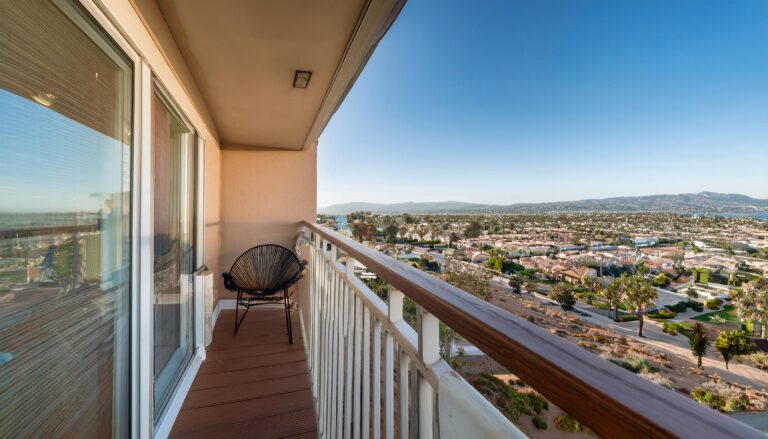What's the difference between SB 721 and SB 326?

Table of Contents
If you own or manage multi-family properties in California, you’ve probably heard whispers (or full-blown alarms!) about SB 326 and SB 721. These two laws, born from a tragic balcony collapse, are all about preventing similar disasters and ensuring your balconies and other “exterior elevated elements” (EEEs) are safe and sound.
But let’s be honest, legalese isn’t exactly light reading. So, let’s cut through the jargon and explore the key differences between these two laws, so you can make informed decisions for your property.
Both SB 326 and SB 721 aim to enhance the safety of balconies and other EEEs by mandating regular inspections and repairs. However, they target different types of properties and have some distinct requirements.
SB 721: The Apartment & Multi-Family Building Law
Passed in 2018, SB 721 applies to:
- Apartments and multi-family dwellings: with three or more units.
- Exterior Elevated Elements (EEEs): This includes balconies, decks, stairs, walkways, and other similar structures that are at least 6 feet above ground level.
Key Provisions:
- Inspections: A qualified inspector (architect, engineer, or certified building inspector) must inspect a representative sample of EEEs by January 1, 2025, and every six years thereafter.
- Repairs: Any unsafe conditions must be repaired promptly.
- Local Enforcement: Local building departments enforce compliance and can issue fines for non-compliance.
SB 326: The Condo & HOA Law
Enacted in 2019, SB 326 builds upon SB 721 and focuses on:
- Condominiums and communities governed by HOAs: with three or more units.
- Exterior Elevated Elements (EEEs): Similar to SB 721, it covers balconies, decks, stairs, walkways, etc.
Key Differences from SB 721:
- Inspection Scope: SB 326 mandates inspection of all EEEs, not just a representative sample.
- Inspection Frequency: Inspections are required every nine years, with the first deadline being January 1, 2025.
- Additional Requirements: SB 326 includes more stringent inspection requirements, including assessment of load-bearing components and waterproofing systems.
Contact DrBalcony for a professional inspection!
Ensure the safety of your balcony and living space with DrBalcony - We're a Tech Engineering firm that specializes in California SB326 & SB721 balcony inspections. Over 300+ completed projects in California.
Request A Free EstimateClick To CallWhy Compliance Matters: Beyond the Legal Ramifications
Sure, hefty fines for non-compliance are enough to get anyone’s attention. But beyond the legal stick, there’s a moral and financial carrot:
- Resident Safety: Balcony collapses are tragic and often preventable. Compliance ensures the safety of your residents and visitors.
- Asset Protection: Proactive inspections and repairs protect your property’s value and avoid costly damage down the line.
- Peace of Mind: Knowing your balconies are safe and compliant allows you to focus on other aspects of property management.
DrBalcony: Your Partner in Compliance
At DrBalcony, we’re well-versed in the complexities of SB 326 and SB 721. Our team of experts can guide you through the inspection process, provide detailed reports, and offer recommendations for repairs to ensure your property is safe and compliant.
Don’t wait until it’s too late. Contact us today for a free consultation and let’s navigate these regulations together.
Contact DrBalcony for a professional inspection!
Ensure the safety of your balcony and living space with DrBalcony - We're a Tech Engineering firm that specializes in California SB326 & SB721 balcony inspections. Over 300+ completed projects in California.
Request A Free EstimateClick To CallFAQ Section: Top Questions & Answers
My property is well-maintained. Do I really need SB-326/SB-721 inspections?
YES! Even with excellent maintenance, hidden issues can develop due to construction errors, material flaws, or severe weather exposure. Inspections are about ensuring those don’t turn into major problems.
Our balconies were inspected a few years ago – isn't that enough?
Unfortunately, no. California laws mandate inspections on a set schedule, often every 6 years. Deterioration can happen quickly, making regular assessments essential.
Can I use my regular handyman for the balcony inspection?
It’s not recommended. Unless they hold specific licenses (architect, structural engineer, etc.) their inspection won’t be considered valid for SB-326/SB-721 compliance.
What if the inspection uncovers major issues?
First, don’t panic! Early detection often means less extensive (and expensive) repairs are needed. Work with your inspector to prioritize fixes, and explore if they offer repair services for a streamlined solution.
I'm worried about the cost of inspections. Are there any resources to help?
Start by getting detailed quotes from multiple companies. Factor in that proactive inspections help you avoid even bigger costs down the line due to neglected problems. Some property management associations offer guidance on budgeting for balcony compliance.
- List Item #1
- List Item #1
- List Item #1
- List Item #1
- List Item #1
I started off by doing 1 inspection with them back in June because I knew it needed work done. Now, they’ve completed 2 of my properties and have 2 more inspections coming up this month. All great so far! They’re great at keeping me updated
- List Item #1
- List Item #1
- List Item #1
- List Item #1
- List Item #1
I would like to share the fact that this company has been extremely honest and helpful with this challenging project. Balcony and walk way repairs are very expensive, so you want the very best professionals next to you
- List Item #1
- List Item #1
- List Item #1
- List Item #1
- List Item #1
Greg was very helpful in explaining the entire process. They walked me through everything and helped me keep both of my properties in compliance!

